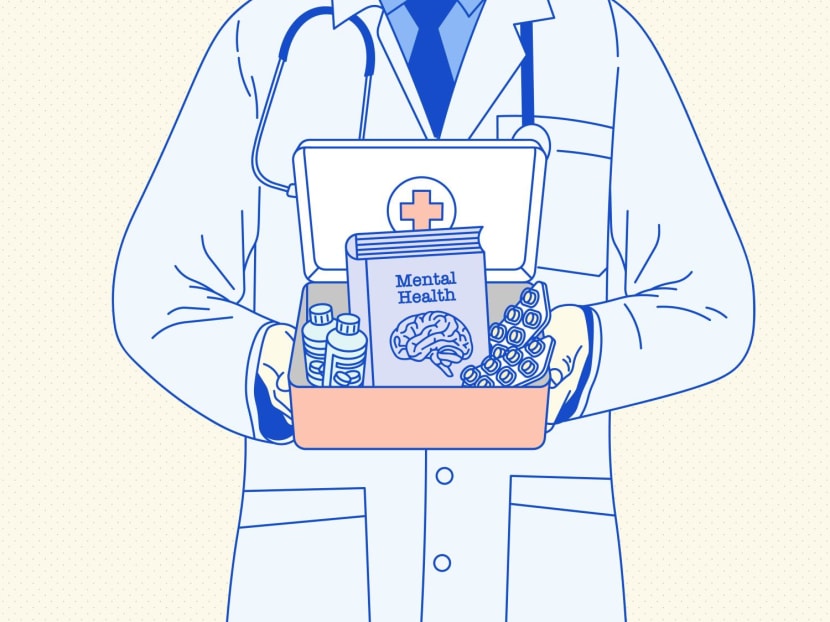Gen Zen: What if someone you know self-harms or has a panic attack? Here is what I learnt about giving mental health 'first aid'

(Illustration: CNA/Nurjannah Suhaimi)
SINGAPORE — When I signed up to attend a 12-hour mental health "first aid" course, I was hoping to learn more of how to offer appropriate words of comfort or advice to people who need a listening ear.
However, I soon realised that being a good listener to someone who is mentally distressed or emotionally unstable is not enough.
It is like having just a roll of adhesive tape in a first-aid kit. You would need the antiseptic wipes, burn cream, bandages and gauze pads, too.
And more importantly, for the uninitiated, you’d need an instruction manual.
Make no mistake: Taking the course does not teach one the skills to be a therapist, or to clinically diagnose anyone.
Its purpose is to train someone to look out for signs of a mental health problem and provide effective support in that moment.
To give a perspective on this, Dr Praveen Nair, a senior consultant at Raven Counselling and Consultancy, said that these skills can take professional clinicians “years to master”.
That was why I fumbled, floundered and tripped on my words when I was first instructed to provide mental health first aid to a coworker in a role play.
I wondered what my resounding failure would have meant if it were a real-life situation.
Much like physical emergencies, mental health emergencies come in various forms and complexities, and an effective first aider needs to know how to identify the problem.
That is what the mental health first aid course by Intellect, an integrated mental healthcare firm, purports to help you do.
The company classified mental health first aid as the initial help offered to a person who is:
- developing a mental health problem
- experiencing a worsening of an existing mental health problem
- in a mental health crisis
The first aid is given until appropriate professional help is received, or until the crisis is resolved.
The course provided by Intellect first comprises six hours of e-modules, which cover:
- four mental illnesses (depression, anxiety, psychosis and substance abuse)
- how to identify symptoms
- the appropriate actions to take depending on the context
Once I had completed the e-modules, I went through another six hours of live training in-person, where I sat in a cosy room along with a diverse group of about 20 other people who felt strongly about mental health advocacy in society.
Together with a trained facilitator, we role-played different situations where mental health first aid was required, in order to practise what we had learned.
We also went through many rounds of personal sharing to discuss our own experiences and the range of complex situations we might face.
I was not expecting to turn into an expert overnight, but I managed to glean some basics on what it takes to be more understanding of people who need care for their mental health.
WHAT I LEARNT
1. Mental health can get better or worsen on a continuum
People often associate mental health directly with mental illness, which can be problematic.
One’s mental health is a continuum (or a scale) ranging from good mental health on one end, to having mental illness on the other.
What is important to remember is that one's health can slide up and down this scale at different points in time and in life.
A particularly stressful few weeks may affect your mental health negatively to a point where your quality of life takes a hit. However, it may not be severe enough to warrant a diagnosis or medical intervention.
Similarly, if someone is diagnosed with a mental illness, this means that it affects a person's thinking, emotional state and behaviour, and disrupts the person's ability to work or carry out other daily activities. However, it does not mean that they cannot get better over time.
2. Asking someone about their suicidal thoughts does not encourage them to act on them
Just the thought of confronting someone about their plans to take their own life feels incredibly taboo and uncomfortable.
However, it might be necessary if you spot the following signs, which are not exhaustive but are the more common ones:
- Verbalising thoughts of suicide or of wanting to die
- Looking for ways to kill themselves such as seeking access to pills, weapons, or other means
- Talking or writing about death, dying or suicide
- Acting recklessly or engaging in risky activities, seemingly without thinking
- Saying they have no reason for living or no sense of purpose in life
It is important to ask a person directly about suicidal thoughts and not avoid using the word "suicide".
Contrary to making them feel worse, the person may feel relief from talking about their suicidal thoughts with someone who cares.
People experiencing thoughts of suicide are often driven by a need to escape overwhelming despair, I’ve learnt, and may not be able to imagine any other way to resolve those feelings.
Simply being present is good because your presence acts as a safety net. People are more likely to act on thoughts of suicide when they are alone.
3. If someone is having a panic attack, breathing into a paper bag is not the answer
This approach, or even saying "take some deep breaths" may work in the moment in some cases to get someone to first try and calm down, but the advice cannot be callously dispensed as if you are mindlessly telling the person to just go and wash their face and leave them at that.
There has to be some follow-up action.
It also points to a larger lesson: There is no one-size-fits-all approach to supporting and treating people with mental health problems.
People need a mix of support and treatments that fit their individual preferences and needs.
In the event of people having a panic attack, rather than making assumptions or judgements about what they need, here is what we can do:
- Ask them directly what they think might help
- Do not belittle their experience
- Acknowledge that the terror feels very real for them, but reassure them that a panic attack, while very frightening, is not life-threatening or dangerous
4. Strong reactions to self-harm can be counterproductive
If a person is cutting himself or herself to cope with emotional distress, you should avoid expressing a strong negative reaction to the self-injury.
Although it is natural to feel upset, helpless and even angry upon finding out that someone is inflicting self-harm, try to remain calm and avoid expressions of shock or anger.
Tell the person that you are concerned about him or her and ask whether you can do anything to reduce the distress. Ask if medical attention is needed.
5. As a first-aider, you are serving as the gateway to getting mentally distressed persons to seek professional help
Despite how much knowledge you may think you have about mental illnesses, or how confident you are in spotting its corresponding signs, we are not the saviour of the world, but mere middlemen.
Furthermore, it is important to remember that people may be reluctant to talk about any mental health problems for various reasons.
When approaching a co-worker who you believe may be depressed, let him know that you are available to talk when he is ready; do not put pressure on him to talk right away.
It can be helpful to let the person choose the moment to open up — and who to open up to as well.
If the person is reluctant, you could explain to him that mental health problems can make it difficult to manage work, relationships and day-to-day tasks, and getting help for those problems can make it easier to cope.
You may also provide information for the person to take away and read later, and reconnect with him at a later time to see if he is more willing to talk.
WHAT EXPERTS SAY
Dr Oliver Suendermann, a clinical psychologist and vice-president (clinical) of Intellect, said that since the firm launched its mental health first aid course in September last year, around 600 people had completed the course.
The cost of its 12-hour programme and an individual certification is S$337.50 a person after tax.
A brief search online showed that other organisations here provided similar mental health or psychosocial first aid courses at various rates from at least S$100.
I reached out to more experts to ask if it will be helpful for people to take up such courses and the responses were mixed.
Mr Haikal Jamil, a senior clinical psychologist and founder of ImPossible Psychological Services, said that such courses can make society more caring and inclusive by helping people to recognise that mental healthcare is common, and that people struggling with mental health conditions are not flawed.
He referred to the most recent Singapore Mental Health Study, which found that 13.9 per cent of Singaporeans are likely to struggle with a mental health condition in their lifetime.
“As the people around those struggling with their mental health are more likely to notice the signs before the struggling individual… having the knowledge of common mental health issues and how to approach them is a good start to increase the likelihood of early help-seeking,” Mr Haikal said.
Dr Nair of Raven Counselling and Consultancy, on the other hand, noted that there is a lack of independent research that supports the purported beneficial effects of mental health first aid for participants.
He believes that government policies — such as having insurance plans that cover various forms of mental illness — play a much larger role than individual private courses in making society more caring and inclusive for people with mental illnesses.
Furthermore, it is difficult to divorce the prevalence of mental illness to the structure of society, Dr Nair added.
For instance, multiple studies have proven a cyclical link between financial worries and mental health problems, so policies that aid with the rising cost of living can help improve a population's overall well-being.
Another point he made was that participants who tend to benefit the most from such courses are those who have certain “necessary prerequisites”, such as emotional intelligence and interest in mental health matters.
In spite of this, I felt as though the various lessons I had learned had made my time and effort worth my while.
Though I cannot claim to be an expert in any mental health condition at all, I am more confident of my role as a discerning and empathetic “middleman” — more cognisant of my peers’ emotions and behaviours, and knowing how to direct them to get help should things get messy.








